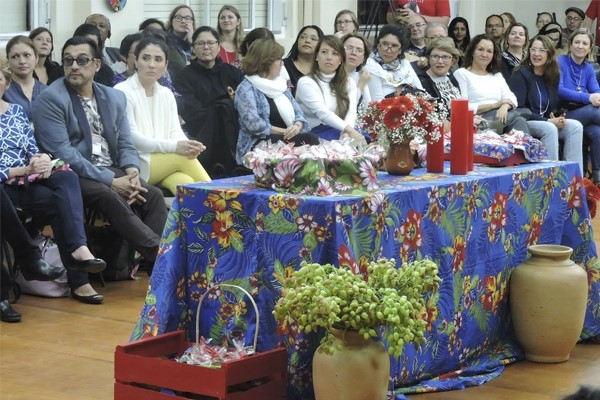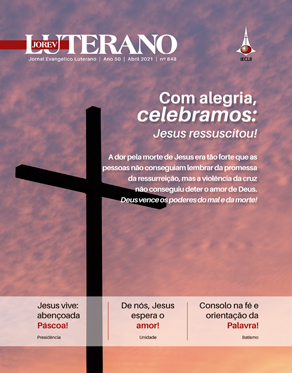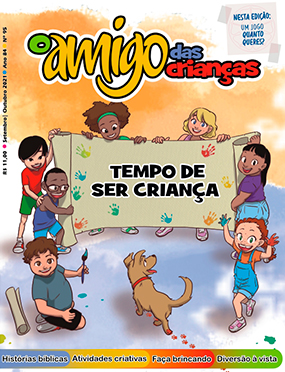
A fragile fabric with intense colors
42 Thesis
of the V Latin American Congress on Gender and Religion
We, dressed in chita, the Brazilian fabric of women and men of the people in the celebration, the struggle and the manifestation of their beliefs, state collectively:
Thesis 1
We are more than 300 people, coming from more than 20 countries, from four continents and all regions of Brazil and gathered to debate over ecology, economy, ecumenism.
Thesis 2
We are part of the celebrations and debates around the 500 years of the Protestant Reformation to present and think our feminist contribution to those debates.
Thesis 3
The reality denounced in 2015 in the Open Letter of the IV Latin American Congress on Gender and Religion aggravated dramatically and quickly.
Thesis 4
The field of Gender and Religion studies, articulated around gender justice, experiences nowadays an intense process of attack articulated by conservative and fundamentalist sectors from the political field and from the churches around the propaganda about the so-called “gender ideology”.
Thesis 5
In face of the phenomenon of violence and feminicide on a political, religious and cultural level that affects the bodies, sexuality and environment it is important to deconstruct the ideological web that supports it from the feminist struggle and the gender studies.
Thesis 6
Brazil lives the consequences of the coup that took place in 2016, which culminated in the impeachment of President Dilma Rousseff.
Thesis 7
The coup is misogynist!
Thesis 8
The reforms – labor, social security and political – are anti-popular and take away rights, especially from women, LGBTIQ people, traditional peoples and communities.
Thesis 9
The frailty of democracy manifests itself in the lack of representation and mechanisms of real participation in the making of decisions.
Thesis 10
It is necessary to take back the democratic process and the strengthening of a lay and direct democracy from now on and in 2018.
Thesis 11
Even in face of all the setbacks, there is an organized resistance to the patriarchal capitalism expressed, for example, in the activities of March 8th and in the General Strike of April 28th 2017 in Brazil.
Thesis 12
Free Rafael Braga!
Thesis 13
The process lived in Brazil is one of the expressions of the conservative and fundamentalist advance all over Latin America and in different parts of the world.
Thesis 14
There is a dangerous discourse of hatred, extremist, essentialist and discriminatory that jeopardizes the acknowledgement of differences over the liberties of belief, expression and existence.
Thesis 15
The way out of the moment we live in will be the result of grassroots popular organization.
Thesis 16
It is necessary to strengthen the social, collective movements and ecumenical organizations in their struggle and defense of human, economic, social, cultural, environmental and sexual rights (DHESCAS).
Thesis 17
It is necessary, also, to articulate in networks of support that have on their agenda the acting against and overcoming of violences in the perspective of a transformative diaconia, grounded in gender justice.
Thesis 18
The revolutionary perspective cannot be lost in our horizon.
Thesis 19
The relationship between scholarship and social movements must be strengthened.
Thesis 20
Sorority and sisterhood start from the consciousness of feminisms, back and communitary feminisms, that propose the intersection of gender, class, race/ethnicity and sexuality, from the theo-practical idea common to the women’s struggles through the understanding of plural feelings, bodies and experiences.
Thesis 21
It is necessary to review the fundaments of feminist ethics, overcoming the use of absolute and universal categories.
Thesis 22
From an indigenous perspective, the reductionist concepts of gender and feminism are questioned.
Thesis 23
Feminist Theology is a visceral experience: history, body, personal and collective experiences, interrelating the knowledges in their diversity.
Thesis 24
The access to sacred literature from a gender perspective reveals the critical power of those texts, in relation to fundamentalist and institutionalizing stiffening processes, which hinder liberation, making it necessary to revise concepts and practices from the context of current communities, rethinking critically the interconnection of the whole of creation and the power relations.
Thesis 25
The discourse of the churches continues to be patriarchal and harmful to women and the environment. That’s why we need to deepen the theological studies with gender perspective.
Thesis 26
We are troubled with the narratives of place and non-place; space; LGBTphobia; the school; the educator; teaching formation; the silencing; the power/control. We want to occupy/dispute places; affirm and act in the movement; care; be newness; seek openness; deconstruct. Position, with more energy, the curiosity, the eroticism/desire, the listening, the “queerness” and the sex as part of an integral life.
Thesis 27
It is necessary to work for an epistemology that dialogues with knowlegdes and flavors produced with our whole body and from the most diverse places of ecosofic knowledges.
Thesis 28
We are a full plate of hunger for justice!
Thesis 29
It is fundamental to recover and publish the histories of women of all ethnicities, more and more integrated, without pre-judices that humiliate and belittle so much all in their humanity.
Thesis 30
We seek to consolidate a solidary society engaged in the promotion and well-being of all people.
Thesis 31
Bem viver is a communitary cosmopraxis of the indigenous peoples of Abya Yala and cannot only be assumed in laws, because it requires a practice and a speaking that are coherent, which many times dos not happen, as is the case with the construction of a road in Bolivia that will slice in the middle the TIPNIS indigenous territory bringing losses to several local peoples.
Thesis 32
Developmentalist policies and greedy exploration destroy the socio-biodiversity and exploit the wisdom of indigenous peoples. It is necessary to acknowledge the indigenous knowledges to overcome discriminations and racism.
Thesis 33
In face of the growing aging of the worldwide, Brazilian and of our communities’ population, it becomes important to pay special attention to the themes relating to the elderly population.
Thesis 34
Life is a dynamic process and aging is part of this process. The transversality of the issue of aging becomes important since it touches essential issues of our lives and of our relations.
Thesis 35
The construction and the care for the common house happens through the respect for life and the valuing of diversity.
Thesis 36
A global ethics is needed, directed to a citizenship of the common wellbeing that is nurtured by contributions of all religions, through intercultural dialogue and in the recovering of the ecology of knowledges of the bem viver (sumak kawsay).
Thesis 37
The ancestry that can reference new identity possibilities is constructed on the way and in the listening of silenced voices.
Thesis 38
It is necessary to revisit the image of the human being in its relation to the sacred in its dynamic and relational character.
Thesis 39
Caring for the common house means to promote dignified life though the fight against poverty and intolerance, the valuing of equality in diversity, the struggle for gender justice and the respect for cultures and religions.
Thesis 40
Despite the difficult situation we want to defend hope, we want to continue fighting tenaciously, aware that another world is possible. This struggle is not individual, but a collective and from the grassroots process, strengthened by the divine wisdom.
Thesis 41
The V Latin American Congress on Gender and Religion was a gathering of diverse people sharing their experiences, their knowledges, their epistemologies, their research and practices in all fields, presented in a multiplicity of activities. Our shared experiences do not fit those thesis, but pour into our daily living and practices of resistance, struggle and production of knowledge.
Thesis 42
We gather here, result of our critical thinking and creativity, as in the fabric of the chita, the intense colors of our research and practices in a fragile fabric, as a contribution to the experiences of faith, struggle, and celebration in the affirmation of the common house.
São Leopoldo, Rio Grande do Sul, Brazil, August 26th 2017.














